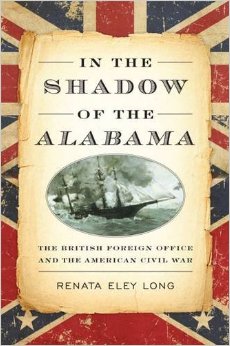Book Review: “In the Shadow of the Alabama: The British Foreign Office And the American Civil War”
When studying the American Civil War, it can be easy to totally immerse oneself in the locality of it all. Tourists leapfrog from battle to battle, sometimes following an ancestor who themselves may not have realized the global ramifications of what was being decided from 1861-1865.
But the fact of it all remains the Civil War very much was a global conflict, with long lasting results on this side of the Atlantic as well as in Europe. An excellently done book that most recently addresses this side of the conflict is Renata Eley Long’s In the Shadow of the Alabama: The British Foreign Office And the American Civil War.
Long’s book, as the subtitles alludes to, is centered on the actions of the British Foreign Office, and the controversial actions of a young clerk, Victor Buckley, whose close familial ties went as far as Queen Victoria. Working as a clerk in the Foreign Office with access to important state documents, Buckley may have helped in passing along work to Confederate agents about the impending seizure of the ship soon-to-be the infamous raider Alabama. Being constructed in England, the Alabama, known as the 290 at the dry docks, attracted the attention of American Secretary Charles Adams, who worked tirelessly to try and prevent from the Alabama sailing.
It is this narrative, about the Alabama’s escape and the destruction it wrought as the Confederate’s best raider, that forms the backbone of Long’s book. Along the way she deftly introduces other characters who played roles, large and small, in the travails of the Alabama. Included is this list is Charles Bulloch, the Confederate agent in charge of funding and outfitting the Alabama, and Henry Hotze, a similar Confederate whose travels for the Confederacy brought him all across mainland Europe.
As one makes their way through Long’s work, they can understand the frustration that American ambassador Charles F. Adams felt at trying to prevent the British from supplying and arming Confederate raiders. Adams and the game of endless politics he needed to play, employing spies and counter agents, at times reads like a novel through the streets of Victorian London and Liverpool. Though foiled in his war endeavors, Adams and the United States would get the last word.
With the end of the war, the ramifications of the Alabama, sunk in battle in 1864, did not end. The last portions of Long’s book relate to the Alabama Claims, a suit against Great Britain from the United States, seeking millions in damages from the Alabama, as well as other Confederate raiders. In the end, the U.S. was awarded $15.5 million in damages to its shipping and commerce by an international committee in Geneva. Like the other portions of her book, Long brings the reader through the tribunals and relates the politicking done behind closed doors to reach arbitration.
Long’s book is a worthy addition to libraries for those who seek to understand the war beyond the familiar battlefields in Virginia, Tennessee, and Georgia.
In the Shadow of the Alabama: The British Foreign Office And the American Civil War by Renata Eley Long
U.S. Naval Institute Press, 2015
212 pages main/254 total
Endnotes, Bibliography, Index


Cool – will have to make sure this book is on my “need to read” list of CW maritime books. Thanks!